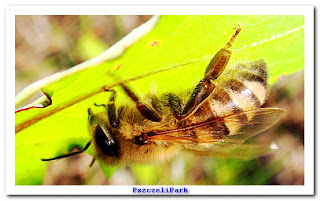Pszczoły i kawa
Pszczoły, tak jak ludzie, lubią
kawę, a przynajmniej jej nektar. Zawarta w nim kofeina poprawia im
pamięć, dzięki czemu wiedzą jak wrócić na kolejne kawowe nektarobranie –
dowodzą na łamach dzisiejszego „Science” uczeni pod kierunkiem dr
Geraldine Wright z Newcastle University.
Kofeina w dużym stężeniu jest gorzka, o
czym pamiętamy, robiąc sobie poranną małą czarną. Nektar kwiatów kawowca
zawiera jej niewielką ilość, dzięki czemu pozostaje słodki. Ci ciekawe,
kofeinę zawiera także nektar cytrusów: grejpfrutów, cytryn, pomelo i
pomarańczy. – W przypadku roślin, kofeina jest częścią mechanizmu
obronnego i smakuje gorzko wielu owadom, w tym także pszczołom. Byliśmy
więc bardzo zaskoczeni, kiedy znaleźliśmy ją w nektarze. Występuje tam
jednak w bardzo niskim stężeniu, zbyt niskim, by pszczoły ją wyczuły,
ale na tyle wysokim, by wpłynąć na ich zachowanie – mówi współautor
pracy w „Science”, prof. Phil Stevenson z Royal Botanic Gardens w Kew i
University of Greenwich.W
trakcie badań uczeni postanowili sprawdzić, w jaki sposób na pszczoły
działają małe dawki kofeiny zawarte w nektarze cytrusów oraz dwóch
odmian kawy: arabiki i robusty. Okazało się, że nawet w niewielkich
ilościach kofeina poprawia działanie pamięci długoterminowej u owadów:
po dawce kwiatowego „espresso” trzy razy więcej pszczół niż w przypadku
zwykłego nektaru pamiętało po 24 godzinach zapach kwiatów kawy czy cytrusów. Po trzech dniach owadów tych było dwa razy więcej niż
zazwyczaj.
Dlaczego to
takie ważne, by owady pamiętały zapach kwiatów? Bo jeśli pamiętają, to
wracają. Każdego dnia pszczoła odwiedza wiele roślin, przenosząc pyłek z
jednej na drugą. W interesie krzaków kawy czy drzewek cytrusowych
leży, by pszczoły pamiętały, gdzie zbierały nektar, przylatywały i
zapytały ich kwiaty.
Anna Piotrowska/EurekNews.pl
Bees Get a Buzz from Caffeine
Scientists have today shown that caffeine improves a honeybee’s memory
and could help the plant recruit more bees to spread its pollen.
Publishing in Science the researchers show that in tests
honeybees feeding on a sugar solution containing caffeine, which occurs
naturally in the nectar of coffee and citrus flowers, were three times
more likely to remember a flower’s scent than those feeding on just
sugar.
Study leader Dr Geraldine Wright, Reader in Neuroethology at Newcastle
University, UK, explained that the effect of caffeine benefits both the
honeybee and the plant: „Remembering floral traits is difficult for bees
to perform at a fast pace as they fly from flower to flower and we have
found that caffeine helps the bee remember where the flowers are.
„In turn, bees that have fed on caffeine-laced nectar are laden with
coffee pollen and these bees search for other coffee plants to find more
nectar, leading to better pollination.
„So, caffeine in nectar is likely to improve the bee’s foraging prowess
while providing the plant with a more faithful pollinator.”
In the study, researchers found that the nectar of Citrus and Coffea
species often contained low doses of caffeine. They included ‘robusta’
coffee species mainly used to produce freeze-dried coffee and ‘arabica’
used for espresso and filter coffee. Grapefruit, lemons, pomelo and
oranges were also sampled and all contained caffeine.
Co-author Professor Phil Stevenson from the Royal Botanic Gardens, Kew
and the University of Greenwich’s Natural Resources Institute, UK, said:
„Caffeine is a defense chemical in plants and tastes bitter to many
insects including bees so we were surprised to find it in the nectar.
However, it occurs at a dose that’s too low for the bees to taste, but
high enough to affect bee behavior.”
The effect of caffeine on the bees’ long-term memory was profound with
three times as many bees remembering the floral scent 24 hours later and
twice as many bees remembering the scent after three days.
Typically, the nectar in the flower of a coffee plant contains almost
as much caffeine as a cup of instant coffee. Just as black coffee has a
strong bitter taste to us, high concentrations of caffeine are repellent
to honeybees.
Dr Wright added: „This work helps us understand the basic mechanisms of
how caffeine affects our brains. What we see in bees could explain why
people prefer to drink coffee when studying.”
Dr Julie Mustard, a contributor to the study from Arizona State
University, explains further: „Although human and honeybee brains
obviously have lots of differences, when you look at the level of cells,
proteins and genes, human and bee brains function very similarly. Thus,
we can use the honeybee to investigate how caffeine affects our own
brains and behaviors.”
This project was funded in part by the Insect Pollinators Initiative
which supports projects aimed at researching the causes and consequences
of threats to insect pollinators and to inform the development of
appropriate mitigation strategies.
Population declines among bees have serious consequences for natural
ecosystems and agriculture since bees are essential pollinators for many
crops and wild flowering species. If declines are allowed to continue
there is a risk to our natural biodiversity and on some crop production.
Professor Stevenson said: „Understanding how bees choose to forage and
return to some flowers over others will help inform how landscapes could
be better managed. Understanding a honeybee’s habits and preferences
could help find ways to reinvigorate the species to protect our farming
industry and countryside.”
Źródło: Pszczoły i kawa

